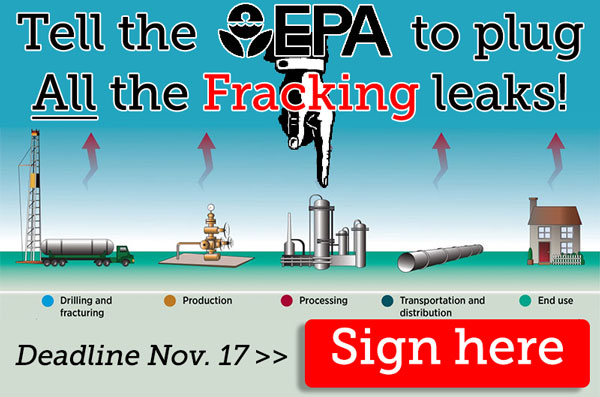|
The EPA has proposed a plan to cap leaking methane from fracking wells, pipelines, compressor stations and other equipment. But the rules need to be tougher and cover ALL fracking infrastructure, not just a few parts of the process, in order to protect public health and our climate. Click here to tell EPA to plug the leaks!
Friend,
Leaks of fracked gas are really bad for public health and our climate. Families near fracking infrastructure have reported much higher rates of asthma, heart problems, liver disorders and even cancer.1 One recent Johns Hopkins University study found that mothers living near fracking sites had a higher risk of premature birth and other complications during pregnancy.2 Even if you don't live near a fracking site or fracked gas pipeline you need to be concerned because fracking leaks are also a huge problem for the climate that effects us all. Methane is the main chemical in fracked gas, and it's 80 times more potent a global warming pollutant than carbon dioxide.3
How big a problem is methane leakage? The frackers want to sell us the gas, so they're not dumping millions of pounds of it into the atmosphere without any rules, right? Wrong. The latest science estimates that we're leaking at least 5 percent of all the gas fracked in America.4 We’re talking about billions of feet of natural gas fracked in America every year -- the same stuff powering or heating millions of homes and businesses -- and something like 5 percent of it is just drifting off into the atmosphere where it’s 80 times as bad for the climate as carbon pollution from a coal fired power plant. That's crazy, and it's got to stop.
Fortunately, the EPA has proposed some new rules (better late than never) to limit fracking leaks. But the new rules only govern new fracking wells and equipment, and don't even cover all the new fracking infrastructure being built in America right now - millions of miles of pipelines, compressor stations, export terminals and more will be left leaking. We only have until November 17 to convince them to make the rules tougher. Sign here to tell the EPA to plug ALL the fracking leaks NOW before it's too late.

The EPA’s rules are a start, but not good enough: In one recent study, on just one part of the fracking infrastructure, researchers found that gathering facilities are leaking eight times (800 percent) as much methane as the EPA estimated.5 The good news that EPA is taking public comments on the rule until November 17.6
If we can demonstrate real public outrage over the fact that fracked gas is really leaky and dangerous for our health and the climate, they'll have to strengthen the rules. We can’t make fracked gas clean, and the only long term solution is to leave this and all fossil fuels in the ground. But while we work for a ban at the state and federal levels, the EPA is long overdue in taking action to protect the families living next to fracking equipment - many of who are already suffering with breathing disorders, heart and liver disease and worse as a result of fracking leaks.
If we can convince the EPA to act, even incrementally, it will make it more expensive to frack, ship and sell gas. Given the current low price of fracked gas and the fact that many fracking companies are hurting for cash,7 that little bit of delay and extra cost might be enough to shut down some wells and pipeline projects, and buy time for us to shut down the industry as a whole.
Any way you look at it, EPA's rules need to be much much stronger to protect public health and the health of our planet. Click here to tell them so before the November 17 deadline and then share with your networks.
Thanks,
Drew and the frack-fighting crew at Environmental Action
1 - Earthworks, Air Pollution from the Oil and Gas Industry, August 18, 2015
2 - Matt Stroud, Johns Hopkins study finds risk of premature birth among mothers near Pa. fracking sites, Pittsburgh Business Times, October 9, 2015
3 - Joe Romm, How The EPA And New York Times Are Getting Methane All Wrong, Climate Progress, August 20, 2015
4 - Chris Mooney, Why the Scientific Case Against Fracking Keeps Getting Stronger, Mother Jones, August 15, 2014
5 - John Schwartz, Methane Leaks in Natural-Gas Supply Chain Far Exceed Estimates, Study Says, The New York Times, August 18, 2015
6 - US EPA, Oil and Natural Gas Air Pollution Standards, August 27, 2015
7 - Jacob Gronholt-Pedersen, Global LNG surplus pushing producers, importers into spot market, Reuters, October 30, 2015 |
